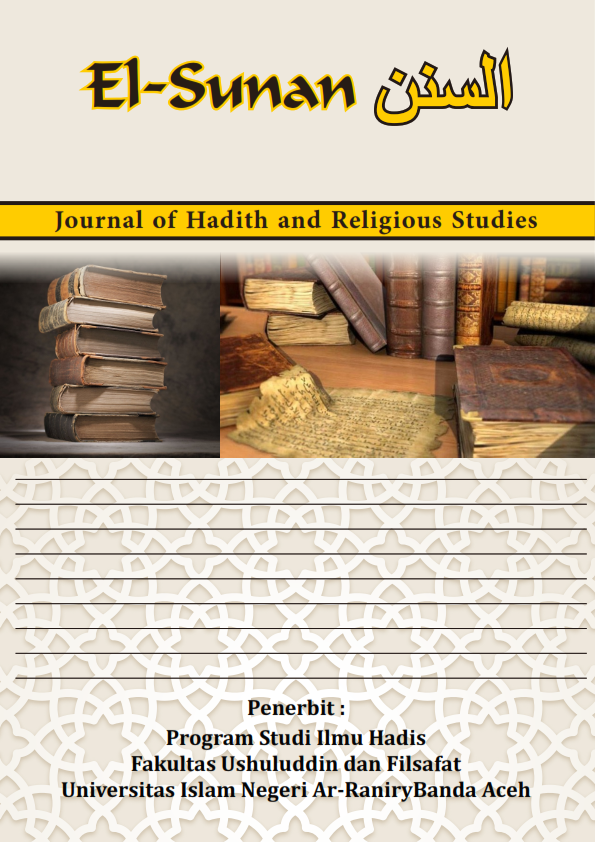Reinterpretation of Gender-Biased Hadiths: A Contextual Approach Towards Gender Equality in Islam
DOI:
https://doi.org/10.22373/el-sunan.v2i2.5988Keywords:
Gender, Hadiths, Qur'an, Contextual ApproachAbstract
Studies on the hadiths of Prophet Muhammad (PBUH) often perceived as gender-biased are frequently conducted through textual approaches, which can result in interpretations that are unfair to women. This approach contradicts the values of gender equality enshrined in the Qur'an. Therefore, contextual analysis is necessary to understand these hadiths in a manner that is more relevant to the dynamics of modern society. This study employs a descriptive-analytical approach using qualitative methods. Primary data, including hadith collections such as Sahih al-Bukhari and Sahih Muslim, as well as Qur'anic exegeses such as Tafsir Ibn Kathir, are analyzed using historical, linguistic, and sociocultural approaches. Modern literature, including the works of Nasaruddin Umar and Muhammad Syahrur, is used as secondary references to support the analysis. The study finds that hadiths such as "women are created from a man’s rib," "women are deficient in intellect and religion," "women are ‘awrah," and "a people who entrust their affairs to a woman will never prosper" reflect specific socio-historical contexts that necessitate reinterpretation. A contextual approach reveals that these hadiths are not intended to discriminate against women but instead provide guidance to maintain harmony in gender relations according to their time. This study affirms that the principles of gender equality in the Qur'an can serve as a foundation for the inclusive and equitable reinterpretation of hadiths.
References
Abduh, Muhammad, and Rasyid Ridha, Tafsir Al-Manar, Jilid III (Dar al-Manar, 1996)
Al-Mu’ati, Kamal Jaudah Abu, Wazifah Al-Maret’ah Fi Nazr Al-Islam (Dar Al-hadi, 1980)
Barella, Yusawinur, Muhammad Yahya, and Ambo Asse, ‘PEMAHAMAN GENDER DALAM PERSPEKTIF HADIS’, Holistic Al-Hadis, 9.2 (2023), pp. 155–75, doi:10.32678/holistic.v9i2.9368
Engineer, A A, The Rights of Women in Islam (Hurst, 1992)
Engineer, Asghar Ali, Pembebasan Perempuan, ed. by Nur Kholik Ridwan (LKiS, 1999)
Fakih, Mansour, Analisa Gender Dan Transformasi Sosial (Pustaka Pelajar, 1996)
———, Analisis Gender Dan Transformasi Sosial (Pustaka Pelajar, 2008)
Ibnu Rusyd, Bidayat Al-Mujtahid Wa Nihayat Al-Muqtashid (Dar al-Ma’rifah, 1982)
Ismail, Syuhudi, Hadis Nabi Yang Tekstual Dan Kontekstual (Bulan Bintang, 1994)
‘Jami` At-Tirmidhi 1173 - The Book on Suckling - كتاب الرضاع - Sunnah.Com - Sayings and Teachings of Prophet Muhammad (صلى الله عليه و سلم)’ <https://sunnah.com/tirmidhi:1173> [accessed 7 December 2024]
Kuper, Adam, and Jessica Kuper, Ensiklopedia Ilmu-Ilmu Sosial, Terj. Haris Mumender (Raja Grafindo Persada, 2000)
Muhanif, Ali, ed., Perempuan Dalam Literatur Islam Klasik (Gramedia Pustaka Utama, 2002)
Nasaruddin Umar, Kodrat Perempuan Dalam Islam (Fikahati Aneska, 2000)
Nawawi, Imam Abi Zakaria Muhyiddin bin Syaraf, Kitab Al Majmu’ Syarh Al Muhadzab Lil Syirazi Juz 3 (Maktabah al Arsyad, 1980)
‘Sahih Al-Bukhari 4425 - Military Expeditions Led by the Prophet (Pbuh) (Al-Maghaazi) - كتاب المغازى - Sunnah.Com - Sayings and Teachings of Prophet Muhammad (صلى الله عليه و سلم)’ <https://sunnah.com/bukhari:4425> [accessed 7 December 2024]
‘Sahih Muslim 715l - The Book of Suckling - كتاب الرضاع - Sunnah.Com - Sayings and Teachings of Prophet Muhammad (صلى الله عليه و سلم)’ <https://sunnah.com/muslim:715l> [accessed 7 December 2024]
‘Sahih Muslim 79a - The Book of Faith - كتاب الإيمان - Sunnah.Com - Sayings and Teachings of Prophet Muhammad (صلى الله عليه و سلم)’ <https://sunnah.com/muslim:79a> [accessed 7 December 2024]
Shihab, M. Quraish, ‘Wawasan Al-Qur’an’, Wawasan Al-Qur’an Tafsir Maudhu’I Atas Pelbagai Persoalan Umat, November, 1996
Shihab, Quraish, Wawasan Al-Qur’an: Tafsir Maudlu’I Atas Pelbagai Persoalan Umat (Mizan, 1996)
Shuqqah, A.A.H.A., and A Salahi, The Character of the Muslim Woman: Women’s Emancipation During the Prophet’s Lifetime, G - Reference,Information and Interdisciplinary Subjects Series (Kube Publishing Limited, 2022)
Syahrur, Muhammad, Al-Kitab Wa Al-Qur’an Qira’ah Mu’ashirah (Al-Ahali, 1990)
Umam, Khaerul, Muhammad Yazid Bustomi, and Agung Maulana, ‘Kesetaraan Gender Dalam Al-Qur’an Dan Hadis: Meluruskan Pemahaman Nash Misoginis’, Tadabbur: Jurnal Integrasi Keilmuan, 3.01 (2024), pp. 1–15, doi:10.15408/tadabbur.v3i01.41458
Umar, Nasaruddin, Argumen Kesetaraan Jender Perspektif Al-Qur’an (Paramadina, 2001)
Webb, Gisela, and Amina Wadud, ‘Qur’an and Woman: Rereading the Sacred Text from a Woman’s Perspective’, ed. by Amina Wadud, Journal of Law and Religion, 15.1/2 (2000), p. 519, doi:10.2307/1051560
Downloads
Published
How to Cite
Issue
Section
License
Copyright (c) 2024 Mira Fauziah

This work is licensed under a Creative Commons Attribution-NonCommercial-ShareAlike 4.0 International License.
- Authors retain copyright and grant the journal right of first publication with the work simultaneously licensed under an Attribution-NonCommercial-ShareAlike 4.0 International (CC BY-NC-SA 4.0) that allows others to share the work with an acknowledgment of the work's authorship and initial publication in this journal.
- Authors are able to enter into separate, additional contractual arrangements for the non-exclusive distribution of the journal's published version of the work (e.g., post it to an institutional repository or publish it in a book), with an acknowledgment of its initial publication in this journal.
- Authors are permitted and encouraged to post their work online (e.g., in institutional repositories or on their website) prior to and during the submission process, as it can lead to productive exchanges, as well as earlier and greater citation of published work.










